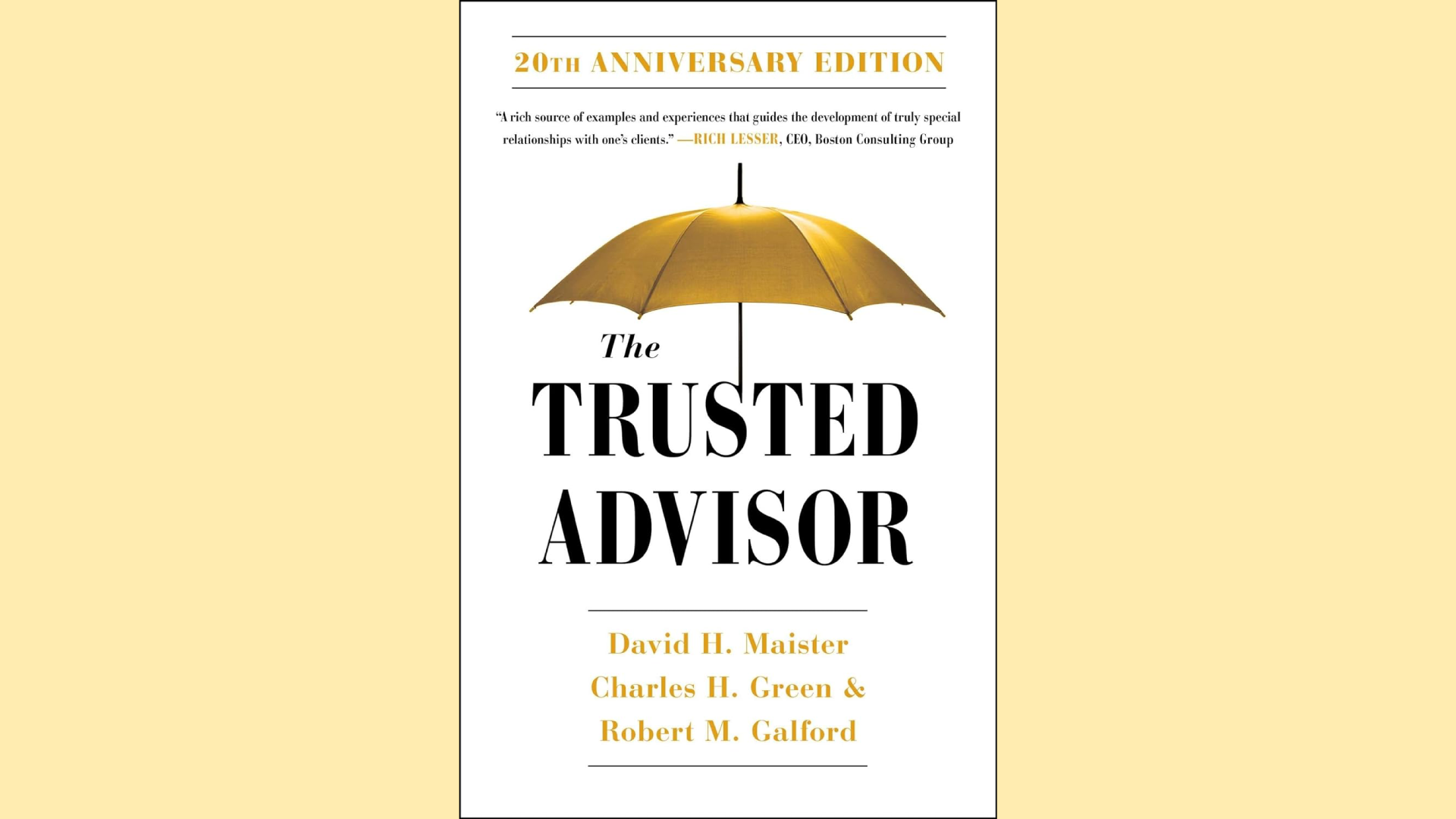Summary: The Trusted Advisor by David Maister

Success is not just about delivering results but about building lasting relationships. "The Trusted Advisor" by David H. Maister, Charles H. Green, and Robert M. Galford offers a comprehensive roadmap for transforming from a service provider to a trusted advisor. Here’s a deep dive into the key concepts and practical steps to achieve this transformation.
Building Trust: The Foundation of Advisory Relationships
The Trust Equation
Trust is the cornerstone of any advisory relationship. Maister, Green, and Galford introduce the Trust Equation, which dissects trust into four components:
- Credibility: This is about your expertise and the perception of your knowledge. Ensure that you consistently demonstrate your competence.
- Reliability: Being dependable and consistent in your actions and promises builds reliability. Follow through on commitments without fail.
- Intimacy: Creating a safe and open environment fosters intimacy. Encourage honest communication by being approachable and empathetic.
- Self-Orientation: Focus on the client’s needs rather than your interests. Clients trust advisors who prioritize their well-being.
"It's not enough to be right. It's more important to get your client to agree with you, to trust you." – David Maister.
Developing Deep Client Relationships
Client-Focused Mindset
Shift from a transactional to a relationship-centric approach. Understand and address your client's long-term goals and needs. This mindset change will help forge deeper, more meaningful connections.
"Clients don't care how much you know until they know how much you care." – David Maister.
Listening Skills
Master active listening techniques. Truly understanding client concerns and perspectives is crucial. Reflect on what you hear and ask clarifying questions to understand their issues' nuances.
Emotional Intelligence
Empathy is key. Use your emotional intelligence to connect with clients on a personal level. Show genuine concern for their problems, making them feel valued and understood.
Effective Communication
Clear and Honest Communication
Be transparent and straightforward. Avoid jargon and ensure your message is clear. Honest communication builds trust and prevents misunderstandings.
"Simplicity and clarity are the keys to communication." – David Maister
Asking the Right Questions
Pose insightful questions that delve into the core of client issues. This not only shows your interest but also helps uncover opportunities where you can add value.
Delivering Difficult Messages
Sometimes, you have to deliver bad news. Do it with tact and empathy, ensuring your client understands you are there to support them through the challenges.
The Trusted Advisor Mindset
Long-Term Perspective
Focus on the client’s long-term success rather than short-term gains. This perspective builds a deeper level of trust and a more enduring relationship.
"The best professionals regard their work as a calling, not just a job." – David Maister.
Value Over Transactions
Prioritize the value you bring to the client. When clients see that your primary goal is their success, they are more likely to view you as a trusted advisor.
Personal Integrity
Always maintain the highest standards of integrity and ethical behavior. Your actions should always align with your words, reinforcing your trustworthiness.
Essential Soft Skills for Success
Interpersonal Skills
Develop strong interpersonal skills. Navigate complex client relationships and internal team dynamics with ease. This ability to interact effectively with others is crucial for building trust.
Conflict Resolution
Master techniques for managing and resolving conflicts. Addressing disputes constructively can strengthen client relationships rather than harm them.
Flexibility and Adaptability
Be adaptable. Clients’ needs and contexts evolve, and your ability to adjust your approach accordingly will make you invaluable to them.
Practical Applications
Case Studies and Examples
Learn from real-world examples and case studies in "The Trusted Advisor." These illustrate how trust-building principles are applied in various professional service contexts and offer practical insights.
Self-Assessment Tools
Utilize the self-assessment tools and exercises included in the book. These tools help you evaluate and improve your trust-building skills, ensuring continuous growth as a trusted advisor.

About David Maister
David H. Maister is a renowned authority in the professional services field. With a decades-long distinguished career, Maister has authored several seminal works on managing and leading professional service firms. His insights have guided countless professionals in consulting, law, accounting, and other service industries.
Maister's practical wisdom is grounded in extensive research and real-world experience, making his advice actionable and impactful. Known for his clarity of thought and deep understanding of the dynamics of professional services, Maister has been a trusted advisor to many of the world's leading firms. His work emphasizes the importance of trust, integrity, and client relationships, which are crucial for anyone aspiring to excel in the professional services sector.
Conclusion
Transitioning from a service provider to a trusted advisor involves more than just delivering excellent results. It requires building trust, developing deep client relationships, and adopting a mindset focused on the client’s long-term success. By mastering the principles outlined in "The Trusted Advisor," you can position yourself as an invaluable partner to your clients, ensuring lasting professional success.
Implement these strategies with confidence, and watch your client relationships transform. Remember, becoming a trusted advisor is not an overnight journey, but it is an achievable and rewarding goal with consistent effort and dedication.
Step-by-Step Guide for an Executive New to Professional Services
- Understand the Industry:
- Research the professional services industry to grasp its unique dynamics and challenges.
- Read foundational books like "The Trusted Advisor" to gain essential insights.
- Build Your Credibility:
- Leverage your existing expertise and continuously seek to expand your knowledge.
- Demonstrate your competence through consistent performance and results.
- Establish Reliability:
- Always follow through on your commitments and promises.
- Develop a reputation for dependability and consistency in your work.
- Foster Intimacy with Clients:
- Create an environment where clients feel comfortable sharing their concerns.
- Practice active listening and empathy to understand client needs deeply.
- Prioritize Client Needs:
- Shift your focus from your interests to those of your clients.
- Ensure that your actions and advice align with the client's best interests.
- Develop Effective Communication Skills:
- Communicate clearly and honestly, avoiding jargon.
- Ask insightful questions to uncover the core issues and opportunities.
- Handle Difficult Conversations with Care:
- Deliver bad news with empathy and tact.
- Show clients that you are committed to supporting them through challenges.
- Adopt a Long-Term Perspective:
- Focus on building long-term success for your clients rather than seeking short-term gains.
- Cultivate a mindset that values enduring relationships over transactional interactions.
- Uphold Integrity:
- Maintain high ethical standards in all your dealings.
- Ensure your actions consistently reflect your words and commitments.
- Invest in Soft Skills:
- Enhance your interpersonal skills to manage client relationships effectively.
- Learn conflict resolution techniques to address and resolve disputes constructively.
- Stay Adaptable:
- Be flexible and willing to adjust your approach based on evolving client needs and contexts.
- Continuously seek feedback and improve your strategies.
- Leverage Case Studies and Tools:
- Use real-world examples and self-assessment tools to refine your skills.
- Apply practical insights from trusted sources like "The Trusted Advisor" to your work.
By following these steps, you can successfully navigate the transition into professional services and build a reputation as a trusted advisor.
